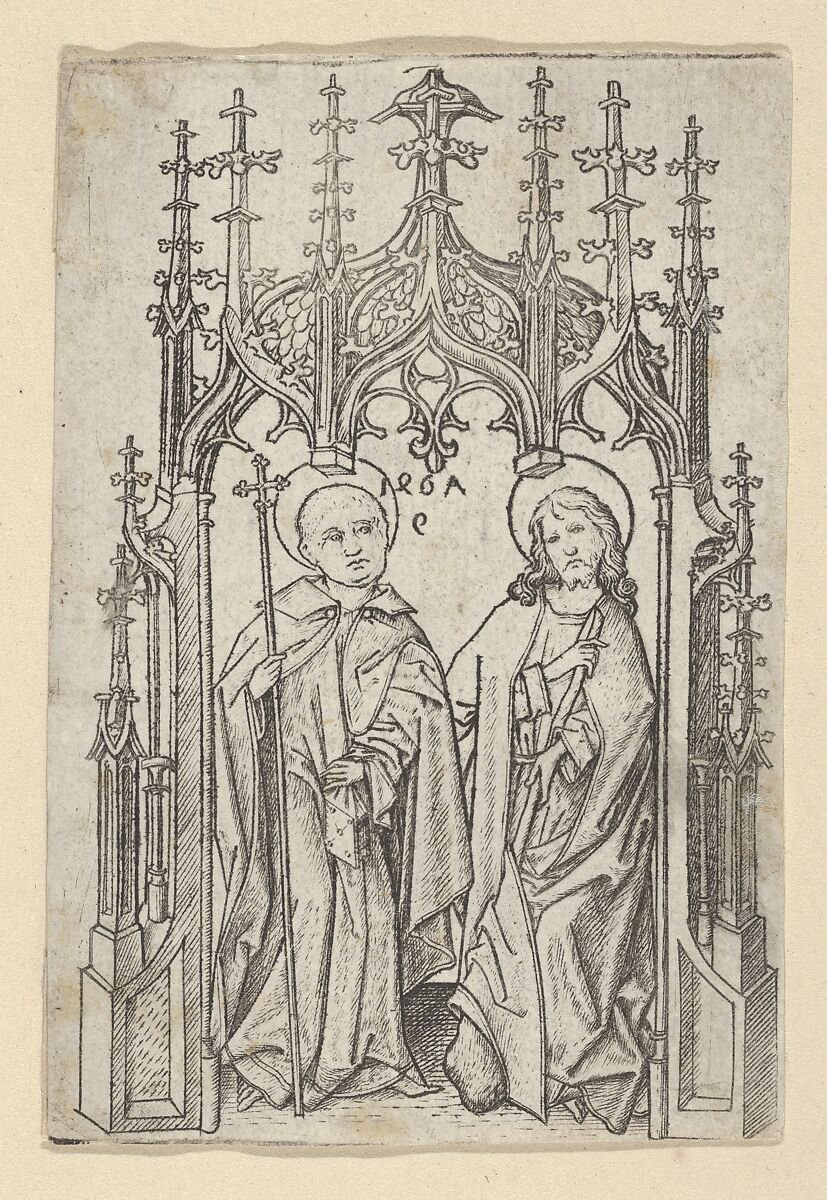Homely Saints
St Philip and St James the Less, from the series “The Apostles” (German, 15th c.)
I always try to bag the midweek noon Eucharist at the Cathedral when a major feast falls on a Wednesday.
It was the usual sort of morning: breakfast, walking Tess, Morning Prayer—I always do Rite One on Sundays and other major feasts— and a bonus half-hour on the elliptical machine. I changed into clericals and took some pride in the fact that my 30x30 pants still fit in the waist but are getting noticeably tight through the thighs, thanks to increasing muscle mass. (My waist is actually a bit smaller now than it was at the very low point of my illness, when I was down to 133 pounds and looked very gaunt. I weighed in at 161.5 this morning.) Then I was off to St Petersburg.
I preached about homely saints. That’s “homely” in the English sense: comfortable, familiar, non-threatening. There are saints who bring us to our knees in awe: Peter, our patron; Paul; Mary Magdalene; the Blessed Virgin herself. And then there are saints like Philip and James—Pip and Jim, as the English say—who are more homely saints. Not James the Just, brother of Our Lord Jesus Christ, so important in the life of the early Jerusalem church. Not James the Great, part of the inner circle with Peter and John, and first among the twelve to be martyred. Just James the Less, about whom we know nothing besides his name, his father’s name, and the fact that Jesus chose him and James said yes.
“You did not choose me, but I chose you.” And he has chosen all of us—us homely saints, us midweek saints—and appointed us that we should go and bear fruit.
Then there’s Philip. Not Philip from last Sunday, of Philip-and-the-Ethiopian-eunuch fame, but the other one, the apostle. We know more about Philip than we do about James the Less. He seems always to have been more of an intermediary, not so much important in his own right, but as a link. A homely saint. Jesus chose him too—we got that story at Morning Prayer—and Philip said yes. And then he told Nathanael: “I’ve found him. The one we’ve been looking for. He’s from Nazareth.” To which Nathanael replied, “Sshyeah. Nazareth. As if.” Philip did not try to lay out his arguments, did not try to reason Nathanael out of his anti-Nazareth prejudice. No. “Come and see,” he said. And Nathanael came, and he saw, and he followed too.
Philip was a link. A homely saint. “Sir, we would see Jesus,” some Greek folks say to him. Philip corrals Andrew, and together they go to Jesus. And in the Gospel for the day, Philip is the prompt for Jesus to reveal still more of himself to his disciples. “Lord,” he pleaded, “show us the Father, and we shall be satisfied.” And Jesus replies that anyone who has seen him has seen the Father.
Philip and James—Pip and Jim—were witnesses. Martyrs—same word. As I noted, that’s why I was wearing red, Eastertide though it is. The first time I put on a chasuble as a priest of the church (and this was probably true of the two other priests in the congregation), it was red: red for the Holy Spirit, but red also for the blood of the martyrs.
I certainly don’t want to be a martyr, and I thank God that it is exceedingly unlikely that he will call upon me to be one. We weekday saints, we homely saints, have not been chosen to be martyrs. But we have been chosen to be witnesses. And that can have its cost. It’s weird, and uncomfortable, to say to someone “Come and see.” No one wants to look like a religious nut. But we homely saints have been chosen, and it is for us to bear witness.
Then off to lunch with two friends, fellow members of the Broletariat. My gain in muscle mass is as nothing by comparison. I am surrounded by friends who are much more serious lifters than I am, more accomplished musicians, more distinguished philosophers. This is very good to keep me from thinking more highly of myself than I ought to think.
I do still think my translation of Augustine’s Confessions is the best, though.
On the drive back to Tampa I called a friend. He had been very much on my heart the day before, and I was moved to pray for him at mass. I have learned to trust such prompting. The conversation proved to be a lovely one, plus now I know why I’m praying for him.
My heavily churched day ended with a Confirmation service in the splendid chapel at an Episcopal school. The chaplain is a good friend, and I went in part to support him and in part because I had heard that the bishop was encouraging clergy to attend and I try to do what my bishop encourages me to do (especially when it involves an easy drive from where I live).
Five students were confirmed. I have to think that even at an Episcopal school it is somewhat counter-cultural to take your faith seriously enough to present yourself for confirmation. No one wants to be a religious nut. But these homely saints bore witness, and may God continue to strengthen them all the days of their life.
If you should wish to subscribe to my (fairly infrequent) posts, just go to https://www.profthomaswilliams.com/ and scroll down to “Subscribe,” where you can enter your email address. Every update includes a link so that you can unsubscribe, so that’s easy.

